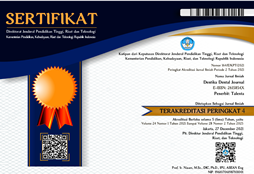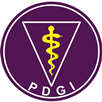ANTI TUMOR ACTIVITY OF PCDNA3.1-TUBEROUS a COMPLEX-2 SENSE IN A HUMAN ORAL TONGUE CANCER (SP-C1) CELL LINE
AKTIVITAS ANTI TUMOR PCDNA3.1-TUBEROUS SCLEROTIC COMPLEX-2 SENSE PADA SEL KANKER LIDAH MANUSIA (SP-C1)
DOI:
https://doi.org/10.32734/dentika.v17i1.1747Keywords:
TSC-2, apoptosis, oral tongue cancer SP-C1, cell growth, p27kip1Abstract
Tuberous sclerosis complex (TSC) is a hamartomatous disease with defects in tuberin (TSC2) that can be autosomal
dominant inheritance or spontaneous mutation. Mutation of the TSC-2 gene encoding tuberin on chromosome 16p13.3
increases to the clinical disorder of tuberous sclerosis characterized by the development of hamartomas. In the present
study, the antitumor activity of pcDNA3.1-TSC2 sense in an oral tongue cancer Supri’s clone-1 (SP-C1) was
investigated. An expression vector containing sense-oriented rat TSC-2 pcDNA with pcDNA3.1 and transfected to cell
(SP-C1) to regulate the expression of TSC-2 gene in each transfectant was constructed. MTT assay was performed to
examine the SP-C1 cell growth suppression transfected by pcDNA3.1-TSC2. Caspase-3 and -9 were conducted to
observe the induction of cell apoptosis. Western blotting analysis was carried out to determine the protein level of TSC-2,
p27Kip1 and ï¡-tubulin. The results showed that, overexpression of TSC-2 exerted the growth inhibitory effect of SP-C1
cell and markedly increased apoptosis via caspase-3 and -9 pathways (P=0.001). Sense-oriented SP-C1-cDNA3.1-TSC-2
cancer cells have a high expression of p27Kip1. In conclusion, pcDNA3.1-TSC-2 sense increased the antitumor activity of
oral tongue cancer SP-C1 cell through p27Kip1 induction.
















